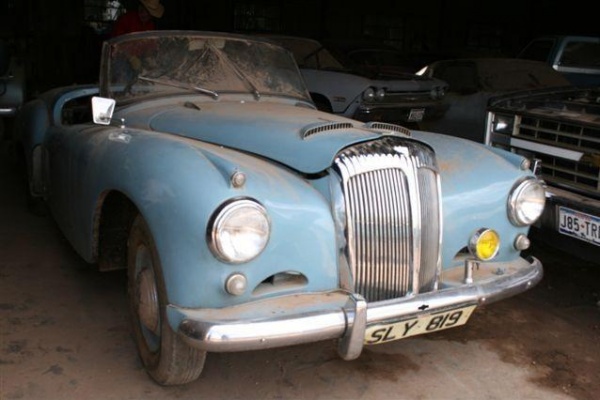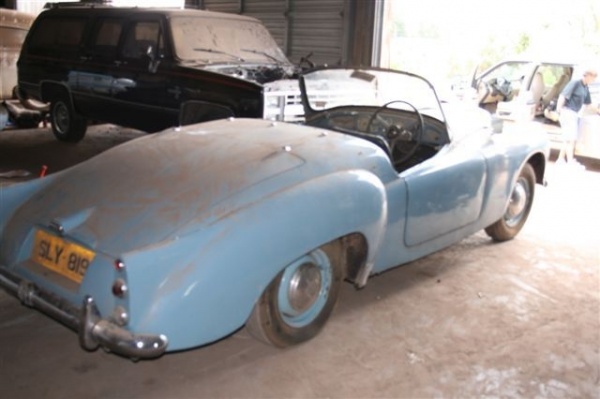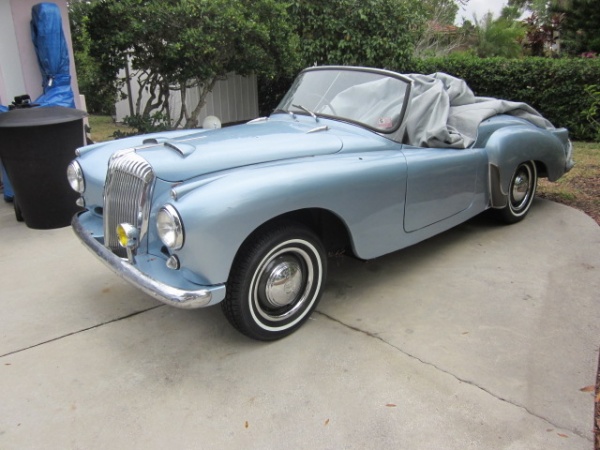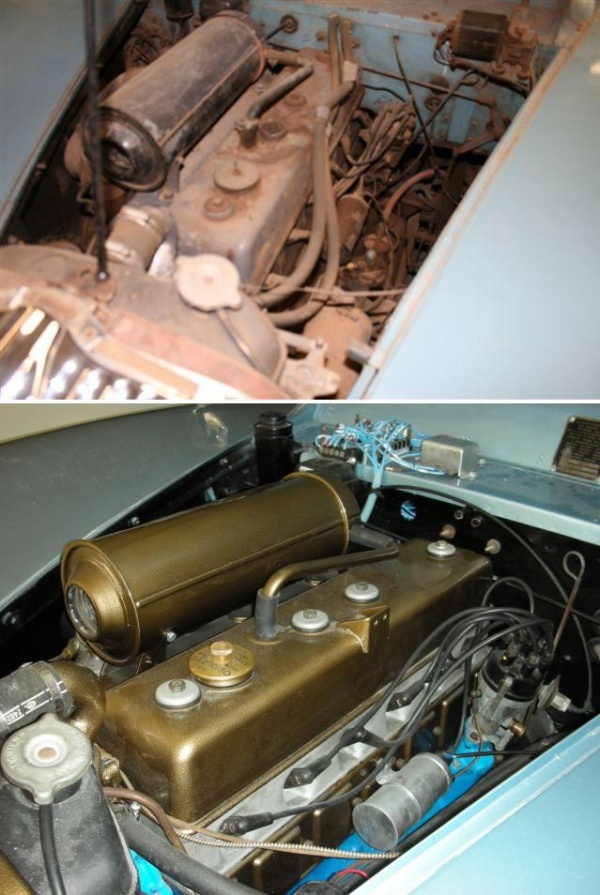
The Daimler Conquest line began life in 1953 as a Saloon car. It was developed to provide affordable luxury at a time when England was moving beyond the post-WW2 period to become a major power in the automotive industry. The most sporting model in the Conquest line was this stylish two-seat Roadster. This rescued and now restored barn find 1955 Roadster is now available here on Hemmings in Clearwater, Florida for $75,000. Special thanks to Henry K. for this submission.

This car is one of only 65 Roadsters produced by Daimler during 1954 and 1955, after which the Roadster was replaced by two- and four-seat Drophead models. This particular Roadster sat unregistered and unused for 30 years in a barn in Texas before being rescued and restored. The dry climate almost certainly helped preserve the bodywork.

The restoration involved media blasting of the body and frame, complete rewiring, and a high quality repaint. The car is said to be one of only three Conquest Roadsters in the US and is described as certainly the best of the three. Surprisingly we just featured one of the others a week ago. Two down, one to go. There is a small amount of work left to complete the restoration, after which this car will likely be one of the best remaining Conquest Roadsters on these shores. The result of the near-complete restoration, as seen above, is impressive.

Befitting their place as the most sporting of the Daimler Conquests, the Roadsters used the more powerful Century version of the Conquest 2.4 liter six cylinder engine, which produced 90 HP and gave a top speed approaching 100 MPH. The engine in this car, shown before (top) and after (below) restoration above, has been completely rebuilt by a master Jaguar mechanic. It drives through a Wilson Pre-Selector gearbox, which allows the driver to select the next gear to be engaged ahead of time, then trigger engagement by simply pressing a pedal – a convenience for the driver at a time when British cars were seldom equipped with automatic transmissions. This Roadster is one of the rarest early post-WW2 British cars. But, would you choose it over a Jaguar of the same vintage?




That is a beautiful car! (ok, not a fan of the Dart like rear tail lights) Would love to be behind the wheel of that car.
What’s with all the blue bits in the engine compartment? Daimlers were always tasteful, but discrete, even the special coach-built cars of Lady Docker would have been less garish in the engine compartment!
Wow, well done restoration on a rare car.
Sure beats the other ‘project’ basket case, that Gullwing motors dragged away from the original family owners and is trying to unload for half of this asking, with ALL the work yetto be done…
Well Boys, you just caught the attention of what might be number number THREE … or maybe even #4! I have an amazing gunmetal blue example that was built for the president of Daimler’s wife in 1957. She had it for 25 years, then when she passed on, the president of the British Daimler Lanchester Club had it for the next 25 years. Then, whilst I was in London, I saw this beauty being rolled off a trailer onto a showroom floor on Kings Road in central London, and I had to have her. Been in California since. Email for interest and foot’s! Frankie
Again sorry boys! Number 5 here! I have #90452 (third one made) in all original condition>
Paint is checked and bad but It drives like new!
Hi Bob Harold here from the daimler club your car 90452 pale blue I be leave I have not got a picture of it.I am about to write a book on the Roadsters and New Drop Head Coupe so any information you have on your car could you let me have it so you will be in the book Cheers Harold
Hi Harold
Have you written and published your book? I would love to purchase a copy.
Thanks
Bob
I have a 1949 consort db18 in dire need of an engine. Are they all gone or are the Brits so tight-lipped that no info is available. With the time I’ve spent on the comp, digging for info, I could’ve dropped my v-8 flathead motor in and be driving. Seller in Virginia lied about the engine and I am at the end of my rope. Help!! before I roll this over-priced Daimler in the river.
Hi , I’ve just bought a roadster and the number is 90451 , so does that mean that I have the second one that was built ?
Yes Indeed! How does it look?
At the moment I am in the process of spraying the under side of the body after a good couple of red oxide layers and and a coat of stone chip , it’s a slow process but I’m getting there 👍
Thanks bob , At the moment she is in a dismantled state , I have a lot of work ahead , on the bulk head there is a brass plate with the number
543 00001 and when I removed it I found a number 2 stamped in the bulk head , , I guess that would confirm that it was the second body built , would all the roadsters have a number stamped in this area ?
I believe so.
My body plate is 003
I am planning to do a cosmetic restoration in the future
For now youngest in college is keeping me poor!
Hi bob , If there is one thing I’ve learnt it’s that restoration projects keep you poor lol .
Don’t give up though 👍
Generally speaking Roadster bodies are stamped on the bulkhead (in a spot covered by the screwed on body number plate) and by the fuel filler cap (where it is covered by the filler neck grommet) with a number which is one number on from the official body number. My guess is that the first body was stamped 1 but didn’t get a body number plate because it was used on the single prototype. This would explain why most bodies are stamped with a number which is one on from the official body number. There are exceptions which probably arose from bodies being used (and fitted with body number plates) out of sequence.
Hi Richard , having read what you said about the cars being stamped one number ahead and the fact mine has number two behind the the plate , would that then confirm my roadster as being the first production built after the prototype ?
Many thanks
Steve